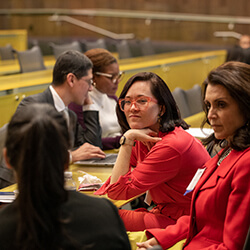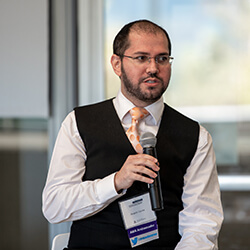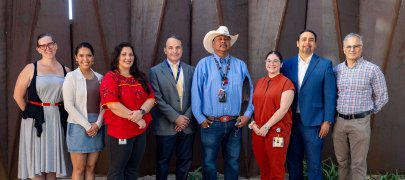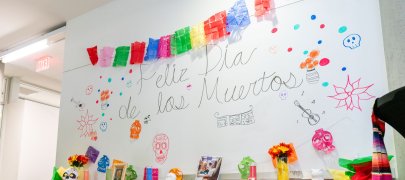Conference Helps Underrepresented Physicians Grow into Faculty Positions
Studies have shown that patients are more likely to receive quality preventive care and treatment when they connect with their providers through race, ethnicity or language. Likewise, minority medical students benefit from being mentored by faculty whose medical careers involve similar paths and challenges as those faced by students.

The University of Arizona College of Medicine – Phoenix hosted the BNGAP 10th Anniversary and Pre-Faculty Career Development conference earlier this year. BNGAP, which stands for Building the Next Generation of Academic Physicians, offers sessions that provide insight into academic medicine. Its mission is to “help diverse medical students and residents become aware of academic medicine as a career option" by offering conferences throughout the country.
In Phoenix, the national conference attracted 200 people, who attended sessions designed to help them explore the many facets of academic medicine. Attendees were from medical schools throughout the country.
The conference was made possible through sponsorships from the college’s Office of Diversity and Inclusion, Phoenix Children's Hospital, BNGAP and Banner – University Medical Center Phoenix.
“We find value in collaborating with other medical schools and by hosting, we were able to bring them here to Phoenix, which increased the college’s visibility. Even though we are a smaller school, we are being very innovative in our thinking and our openness to new ideas,” said Sonji Muhammad, director of the Office of Diversity and Inclusion.
According to a report from the American Association of Medical Colleges, medical school faculty is 63.9 percent White overall, especially so at the professor and associate professor ranks. There remains an underrepresentation of racial and ethnic minority groups in teaching and faculty positions.
The mission of BNGAP is to help diverse medical students and residents become aware of academic medicine as a career option and provide them with resources to explore and potentially embark on an academic medicine career.
“One of our main activities is implementing educational workshops to increase diverse trainees’ awareness of academic careers. We implement pre- and post-workshop evaluations to assess learners' change in confidence and knowledge toward academic medicine careers,” said BNGAP board member John P. Sanchez, MD, MPH.
The first curriculum created by BNGAP, consisting of 12 workshops, has been implemented at more than 30 medical schools throughout the country and experienced by more than 1,500 diverse medical students and residents.
Over the past 10 years, BNGAP has collaborated with medical schools interested in building pre-faculty development pathways at their school, including the College of Medicine – Phoenix.
This education is incredibly pertinent to outcomes in health care. According to the Health Professionals for Diversity Coalition, by interacting with individuals from different ethnic and racial backgrounds during training, health care professionals are better equipped to serve the country’s diverse population.
Having the opportunity to host the BNGAP conference is just one of the many ways the College of Medicine – Phoenix is advancing inclusive excellence through medical education and community engagement.

The office has worked to increase funding for research and scholarships for initiatives that pertain to diversity and inclusion. They also have created mentoring opportunities for diverse students, faculty, residents and physicians.
Ricardo Correa, MD, a clinical assistant professor in the Department of Internal Medicine, Division of Endocrinology, was recently named Graduate Medical Education (GME) diversity director for the college. Dr. Correa will chair the newly established Diversity and Inclusion subcommittee.
Topics
About the College
Founded in 2007, the University of Arizona College of Medicine – Phoenix inspires and trains exemplary physicians, scientists and leaders to optimize health and health care in Arizona and beyond. By cultivating collaborative research locally and globally, the college accelerates discovery in a number of critical areas — including cancer, stroke, traumatic brain injury and cardiovascular disease. Championed as a student-centric campus, the college has graduated more than 900 physicians, all of whom received exceptional training from nine clinical partners and more than 2,700 diverse faculty members. As the anchor to the Phoenix Bioscience Core, which is projected to have an economic impact of $3.1 billion by 2025, the college prides itself on engaging with the community, fostering education, inclusion, access and advocacy.


